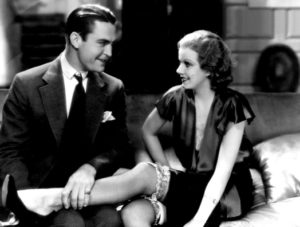 In the years immediately following the introduction of sound to the movies, there was a remarkable period of frankness in the Hollywood film. This coincided with the darkest years of the Great Depression, and as if to offer release from this economic burden, the movies reflected a greater honesty about social and sexual mores. At this point, the conservative guardians of morality became alarmed—church groups threatened to boycott Hollywood unless the studios agreed to put a lid on all this freedom of expression. Thus began, in 1934, the serious enforcement of the Motion Picture Production Code, a form of self-censorship by the studios that would banish permissiveness from American films for the next three decades. That brief period of freedom between 1929 and 1934 is now known affectionately as “Pre-Code Hollywood.”
In the years immediately following the introduction of sound to the movies, there was a remarkable period of frankness in the Hollywood film. This coincided with the darkest years of the Great Depression, and as if to offer release from this economic burden, the movies reflected a greater honesty about social and sexual mores. At this point, the conservative guardians of morality became alarmed—church groups threatened to boycott Hollywood unless the studios agreed to put a lid on all this freedom of expression. Thus began, in 1934, the serious enforcement of the Motion Picture Production Code, a form of self-censorship by the studios that would banish permissiveness from American films for the next three decades. That brief period of freedom between 1929 and 1934 is now known affectionately as “Pre-Code Hollywood.”
If you wanted a classic example of how a Pre-Code Hollywood film differs from the more familiar type of film made after the Code, you couldn’t do much better than Red Headed Woman, an MGM production from 1932 directed by Jack Conway. Jean Harlow plays Lillian Andrews, a scheming sexpot who seduces her married boss (Chester Morris), causing divorce and general mayhem in the lives of those around her. Now, it’s not just the relative sexual frankness, or the depiction of extramarital affairs as a regular aspect of life that makes the film stand out. Here the main character’s behavior is not even mitigated by charm or good intentions. Harlow plays a vulgar, manipulative climber who will not hesitate to destroy a marriage or cheat on a lover if it will advance her up the social ladder. The picture doesn’t approve of her, but it doesn’t go out of its way to punish her either. It just allows her free rein for her appetites, with results both dramatic and hilarious.
Jean Harlow’s limited range tended to make her seem out of place in more complicated roles. Here she’s at her best, in a part that requires her to be tough and crude, a relentless figure of pure selfishness. In its own way, this was just as much of an offense against propriety as Mae West’s serenely bawdy characters. Harlow was the incarnation of the working-class woman with no use for the sort of feminine refinement that was expected of good girls. This persona, with its undercurrent of female sexual desire, had a lot to do, I think, with Harlow’s popularity. In Red Headed Woman one can’t help but be a little repelled by her character even as one laughs. And I believe this is just what the script, by the legendary Anita Loos, intends us to feel.
Una Merkel, as Lil’s best friend, offers wisecracking commentary from the sidelines. Chester Morris, the love interest, is a bit of a lump, but he manages some shifty, amusing reactions with his eyes. Charles Boyer even shows up as an amorous chauffeur. The men in the film stumble about, trying to deal with the force of nature that is Harlow, and the whole thing is absorbing, convoluted, and funny in the peculiar way that only movies from that brief era of the sound film managed to be—making you laugh at your own capacity to be offended by people’s marital and sexual foibles.
The ending is to die for.

